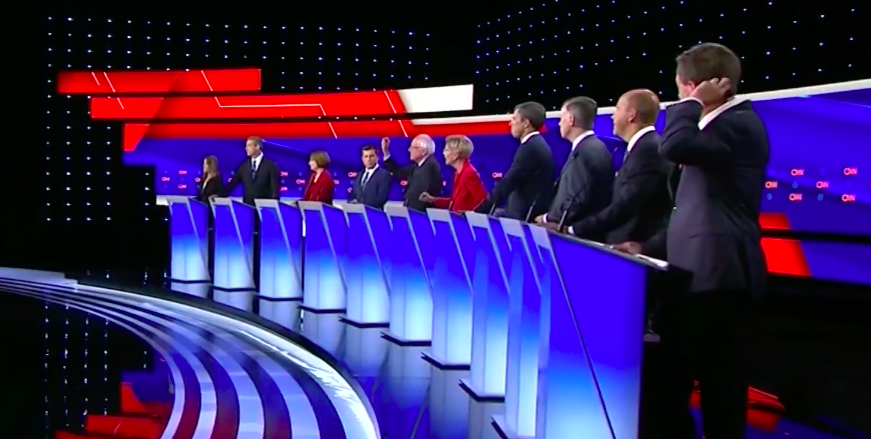Editorial: What we want from the debate
Ten Democratic candidates will share the stage for the third Democratic presidential primary debate Thursday.
September 11, 2019
The third Democratic presidential primary debate will take place Thursday, marking the first time the Democratic National Committee has narrowed the field of candidates enough to contain them on one stage. The previous two debates saw 20 candidates making bold statements about important issues such as health care and climate change, but also about each other.
While some attacks made sense in terms of a candidate’s policy history — such as Rep. Tulsi Gabbard pointing out Sen. Kamala Harris’ “tough on crime” record — others seemed more rhetorically designed to get a reaction from viewers than to inform them.
At times, the moderators aided candidates in this endeavor. CNN’s Jake Tapper opened questioning at the first debate by noting criticisms of Sen. Bernie Sanders’ “Medicare for All” plan. Then, instead of asking policy-oriented questions about Sanders’ plan, he used another candidate’s words:
“Congressman [John] Delaney just referred to [Medicare for All] as bad policy, and previously he has called the idea political suicide that will just get President Trump re-elected,” Tapper said. “What do you say to Congressman Delaney?”
This question largely set the tone for the evening — positioning the candidates against each other instead of digging into policy issues that deeply affect many Americans.
This time, we hope to see a stage full of candidates and moderators who remember why they’re there: to serve the American people and to ensure they can be fully informed about the issues they’ll be voting on.
So, from the Editorial Board in the heart of the first-in-the-nation state, here are some of those issues:
According to Iowa College Aid, 59 percent of Iowa State University students graduate with debt. The average graduate carries $28,701 in debt upon graduation. Higher education is routinely underfunded in Iowa, and it’s important for students to know how a potential president plans to tackle the student debt crisis.
Mass shootings in Texas and Ohio have made headlines in recent weeks — not a rare occurrence in present day America. The U.S. House of Representatives passed universal background check legislation in February, and even though a majority of Americans support background checks, the bill didn’t make it to the Senate floor due to partisan gridlock. We need candidates to present positions that show voters how they plan to navigate the politics of the issue to protect Americans.
Countless scientific reports have warned of climate change’s impact on the environment, and recent flooding in Iowa has demonstrated how real the problem is for us. The science tells us that we’re reaching a point of no return, and we need candidates to tell us how they’re going to prioritize environmental policy.







